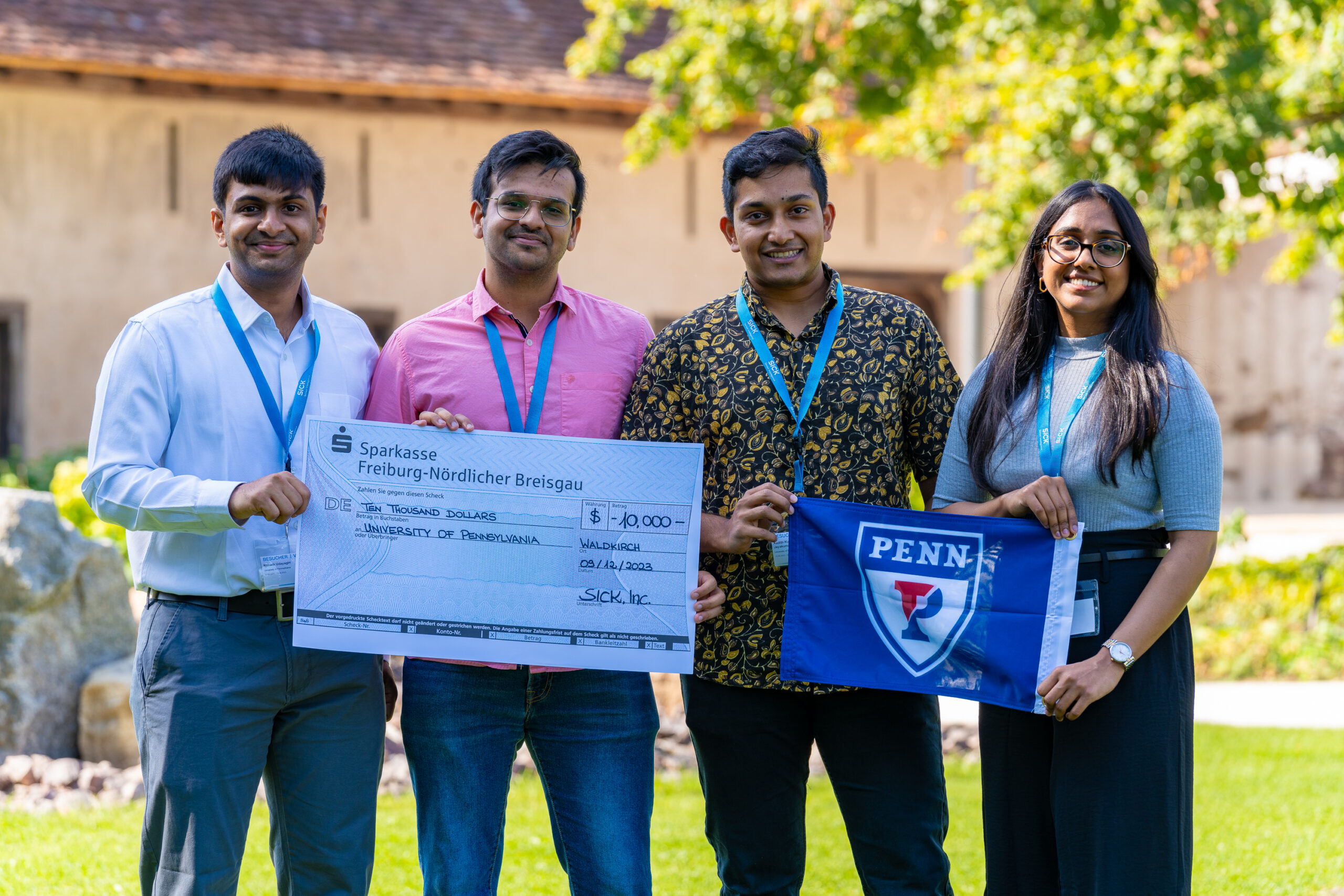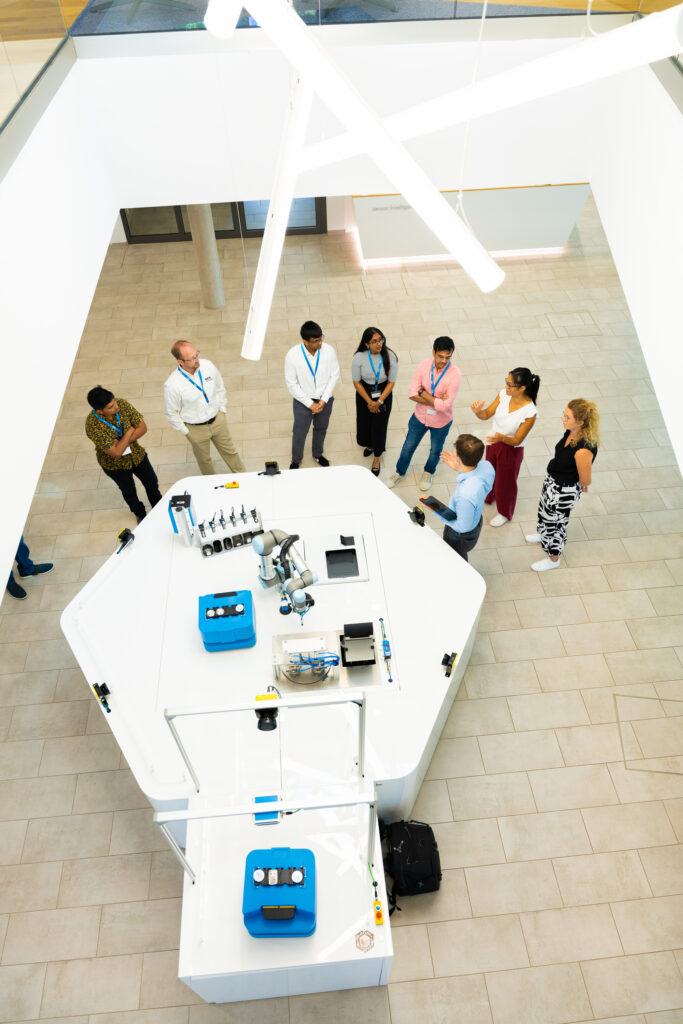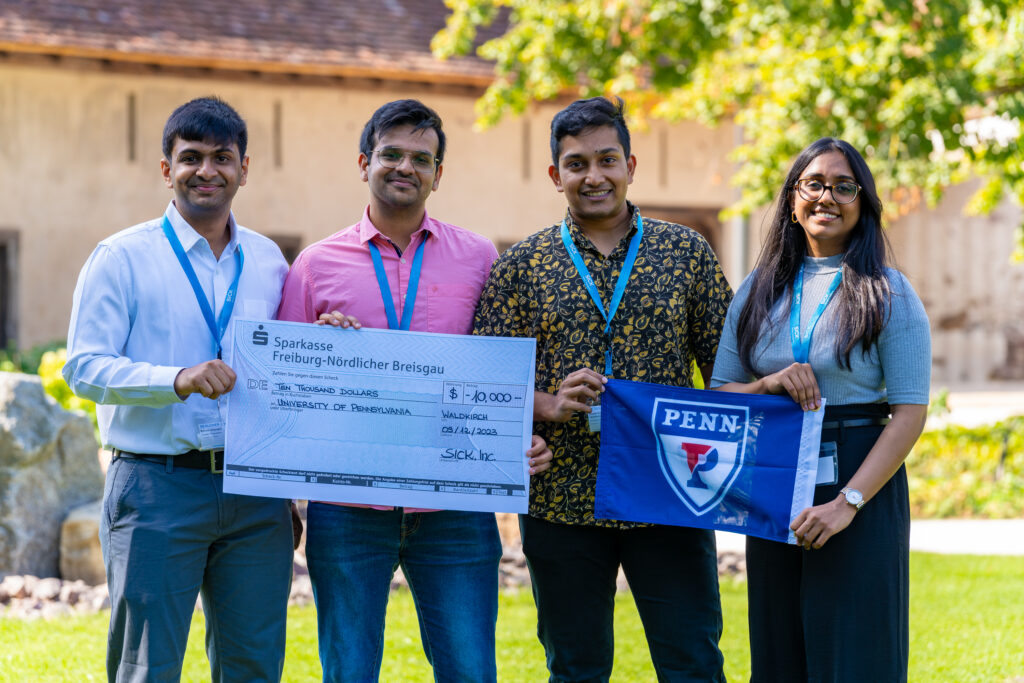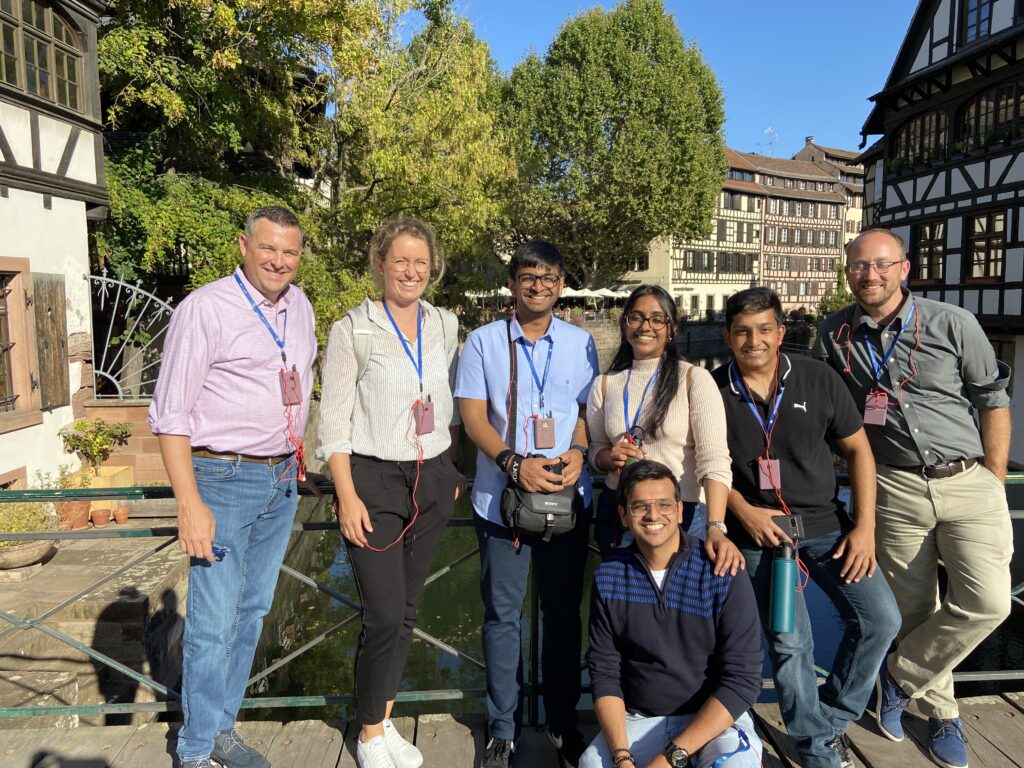
Text by Jillian Mallon
Five months after being awarded first prize in the 2022-2023 SICK $10K Challenge as well as receiving their master’s degrees in robotics from the University of Pennsylvania, the winning group behind the SauberBOT project was flown to SICK’s headquarters in Germany to accept their prize.
SICK, a global manufacturer of industrial sensors, hosts a yearly challenge for university student groups across the US and Canada to incorporate one of their LiDAR sensors into a project designed to “solve a problem, create a solution and bring a new application that utilizes the SICK scanner in any industry”. The 2022-2023 competition was dubbed the “TiM$10K Challenge” at the time because the fifteen participating student groups were provided with a SICK TiM-P 270 ° 2D LiDAR sensor to use in their inventions. Three student groups from GRASP were among the 15 groups selected to participate, and two of these groups won first and third prize!
The first place winners were Aadith Kumar Jayakumar, Aadit Patel, Pranav Prashant Shah, Sharon Richu Shaji, and Rithwik Udayagiri, who invented a robot they called SauberBOT. Named after the German word for “to clean”, SauberBOT is an autonomous robot that aims to assuage the impact of a shortage of labor in the cleaning industry by scanning a predefined geofenced region to identify and collect discarded litter.
The SauberBOT team was invited to the company’s headquarters in Germany from September 12th to 14th to accept their $10,000 prize. The start of their journey had its fair share of speed bumps. First, Aadit Patel was unable to attend and next, each of the other winners’ departing flights were canceled within hours of the expected departure.
“I was the last one to reach Basel and I was not sure of what flight I was boarding until I physically reached JFK airport,” recalls Pranav Shah. “My rescheduled flight route took me from New York to London to Amsterdam and then finally Basel… a very strenuous, long flight with multiple layovers! But nevertheless, we did make it to Germany!”
Once the team finally arrived, it was clear that things were going to run much more smoothly as SICK had carefully and expertly planned a detailed and comprehensive itinerary that was enriching both educationally and culturally. They were greeted at the Basel airport in Switzerland by Bryan Sellars and Aaron Rothmeyer of SICK US who escorted them through a three-day exploration into the inner workings of SICK and the culture of the region.

Photograph by: SICK’s Dschafar El Kassem.
From left to right: Aadith Kumar, Aaron Rothmeyer (SICK), Rithwik Udayagiri, Sharon Shaji, Pranav Shah, Lan-Anh Buchta (SICK), Carolin Baumgartner (SICK), and Julian Haidu (SICK).
The first full day of the visit on September 12th started at the recently established training center, Sensor Intelligence Academy (SIA), in Walkirch, Germany, with a selection of demonstrations and presentations on SICK’s research and technologies.
“We all knew that SICK was a major player in safety devices, but the trip showed the extent of their product portfolio and the sheer number of patents they hold,” remembers Sharon Shaji. “It was fascinating to see the depth and breadth of SICK’s sensor technologies.”
SICK also held a small awards ceremony during which the group was presented with a commemorative check for their award. The students had many interesting discussions during the day’s activities about the potential for their prize-winning invention.
“We received a lot of positive feedback about SauberBOT and also some interesting questions that we had not thought about,” Rithwik Udayagiri stated. “The suggestions we got from the SICK team were valuable insights for us from a robotics and business viewpoint.”
“The main thing we got to know is that the people at SICK see a lot of potential in SauberBOT to become a start-up,” added Pranav Shah.
September 13th was the most technically informational day of the visit. The students traveled to Reute for a tour of SICK’s production and logistics center. The SauberBOT team had discussed the intercultural differences between the engineering industries in Germany, America, and India with the SICK team the day before, but this facility tour in particular encapsulated the intricate planning involved in German engineering.
“We got to visit SICK’s production and testing facility and witness the production line for some of the sensors that they manufacture and also see the testing facility where they perform rigorous testing of the products to ensure product quality,” described Pranav Shah. “I personally found it very interesting to see how meticulously everything was planned, the immense scale of the operation and, as an engineer, it was great to finally witness German engineering. ”
Aadith Kumar echoed this sentiment, stating, “The German work culture and the focus on quality before brute economics were amazing.”

The final day of their visit on September 14th took them to the Distribution Centre in Buchholz, Germany. The students were captivated by how highly automated their warehouse and Outdoor Technology Center were.
“We first visited the automated packaging facility where we saw the immense scale of automation at play. The highlight of the facility was that SICK uses their own sensor suite for automating their facilities which I think only a few companies can brag about,” described Pranav Shah. “We also saw the outdoor testing facility where some of their outdoor rated products go through some rigorous testing. Throughout the trip, it was really inspiring and engaging to talk to different engineers and just discuss technology, various applications and sometimes also discuss the pros and cons of certain approaches.”
While the first half of each day’s itinerary was educational, SICK filled the second half of each day with exciting sightseeing opportunities. The SauberBOT team enjoyed a walking tour of Freiburg and a local brewery tour on day one, a segway tour through the Black Forest mountain range and a slice of authentic Black Forest cake on day two, and a walking tour of Strasbourg in France on day three.

“The entire trip was unforgettable for me. It marked my first time in Europe, and in just a week, we visited four countries,” said Sharon Shaji. “Exploring the headquarters, the various centers and meeting the people of the company was a great learning experience. Plus, doing all of this with my friends made it even more incredible.”
The 2023-2024 SICK$10K Challenge is now in progress and newly formed groups of current Robotics Master’s students are participating in the challenge. This year, students are challenged to create a project that incorporates the multiScan100 3D LiDAR sensor.
The SauberBOT team has some suggestions for the current and future groups at Penn who enter this competition.
“Just go for it and try to solve an issue that is really required in society,” suggested Pranav Shah. “The challenge is not to see who has the best tech. The challenge is to see who has the best idea that is marketable and has the potential to be turned into a sellable product. If you enter this competition, do not only focus on the tech but also focus on the market research to corroborate your project proposal.”
Ultimately, the SICK $10K challenge and the sponsored trip was a rewarding experience that the SauberBOT team would recommend to their peers. It was an eye-opening look into a career in the robotics and engineering industries that compelled the SauberBOT team to consider careers in the industry. In fact, one team member, Sharon Shaji, has since started a position as a systems application engineer on SICK’s industrial robotics team.
“I always knew that I wanted to work in the industry, but the trip provided such valuable insights into the industry, especially witnessing the cutting-edge technologies at SICK,” Sharon Shaji shared. “It solidified my interest in a career in industry, where I can actively contribute to the development and application of innovative technologies.”
Featured People
Robotics MSE '23 - Engineer at Qualcomm
Robotics MSE '23 - Automation Engineer at Aerovect Technologies
Robotics MSE '23
Robotics MSE '23; Systems Application Engineer II - Industrial Robotics at SICK Inc.
Robotics MSE '23
